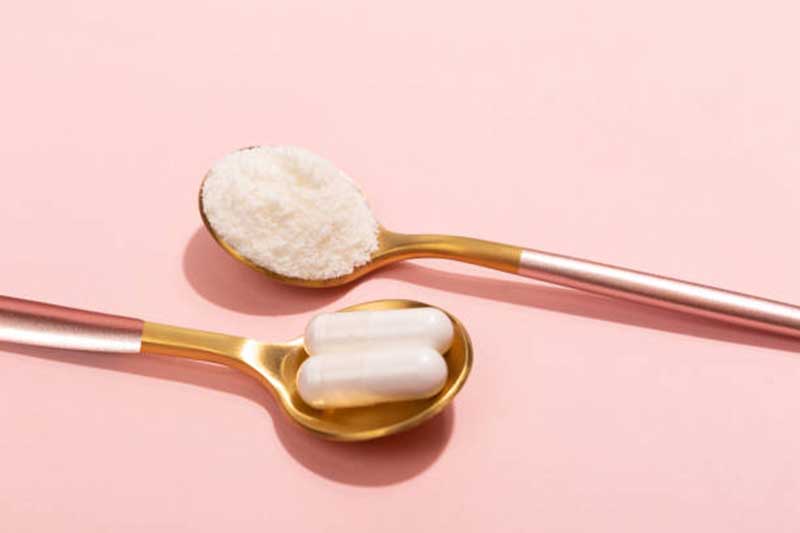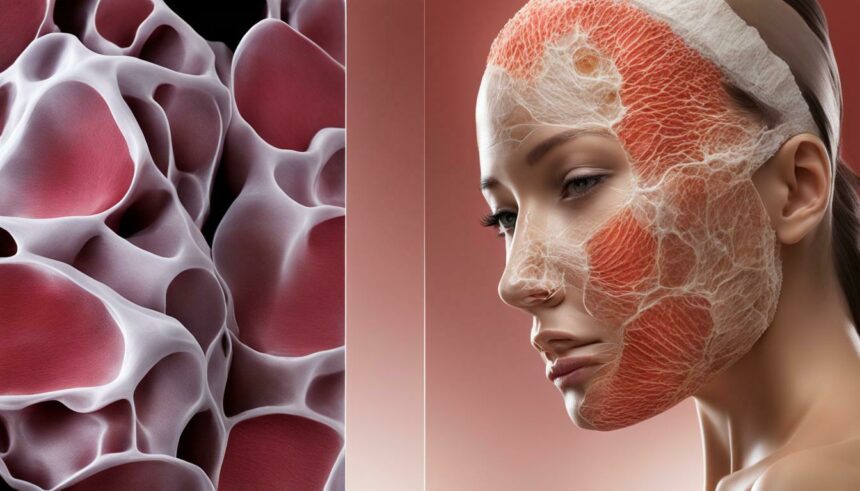Collagen is a protein that is essential for maintaining the structural integrity of our bodies and promoting optimal skin and bone health. However, not all collagen is created equal. Skin collagen and bone collagen are two distinct types of collagen that serve different functions in the body. In this comprehensive guide, we will take a closer look at the differences between skin collagen and bone collagen, explore the benefits they offer, and discuss how collagen supplements can support healthy skin and bones.
Key Takeaways:
- Collagen is the most abundant protein in our bodies and provides structure and strength to our tissues.
- Skin collagen and bone collagen are two distinct types of collagen that serve different functions in the body.
- Skin collagen provides structural support, elasticity, and moisture retention, while bone collagen forms the structural framework of our bones.
- Collagen supplements can support healthy skin and bones by promoting collagen synthesis and consumption.
What is Collagen?
Collagen is the most abundant protein in our bodies and is responsible for providing structure and strength to various tissues. It consists of long chains of amino acids and differs in composition between the various types of collagen that serve different functions in the body.
Collagen production is carried out by cells called fibroblasts and plays a crucial role in maintaining the integrity of our skin, bones, tendons, and other connective tissues.
There are over 28 known types of collagen, each with unique functions in the body. The most common types of collagen found in the body are types I, II, and III. Type I collagen is the most prevalent and is responsible for the strength and structure of skin, bones, tendons, and ligaments. Type II collagen is found in cartilage and is essential for maintaining joint health, while type III is found in blood vessels, skin, and internal organs and plays a role in maintaining their strength and structure.
The function of collagen in the body is critical for maintaining healthy, youthful-looking skin and strong bones. Additionally, it contributes to the health of our joints, tendons, and ligaments allowing for mobility and flexibility.
Skin Collagen: The Foundation of Healthy Skin
Skin collagen is a critical protein that supports healthy, youthful-looking skin. It is primarily found in the dermis, the middle layer of the skin, where it provides structural support and elasticity. Collagen synthesis in the skin decreases with age, leading to wrinkles, fine lines, and sagging skin. However, incorporating collagen into skincare products and treatments can help slow down these signs of aging and improve skin health.
Collagen benefits for skin include:
- Reducing the appearance of wrinkles and fine lines
- Improving skin elasticity and firmness
- Hydrating and moisturizing the skin
- Strengthening the skin barrier to protect against environmental stressors
Collagen synthesis in the skin can be enhanced through various skincare practices, including:
- Topical application of skincare products containing collagen-boosting ingredients, such as vitamin C, retinoids, and peptides.
- Facial treatments like chemical peels and micro-needling that stimulate collagen production through controlled injury to the skin.
- Dietary intake of collagen-rich foods like bone broth, fish, and meat.
- Collagen supplements, which can provide the body with the building blocks necessary for collagen synthesis.
While collagen in skincare products can improve skin health and appearance, its effectiveness depends on the collagen molecule’s size and whether it can penetrate the skin’s protective barrier. Additionally, topical collagen cannot replace the body’s naturally-produced collagen, making collagen supplements a more direct approach to supporting collagen synthesis in the skin.
Bone Collagen: The Essential Component of Strong Bones
Bone collagen is a critical part of our skeletal system, providing the framework that gives our bones strength and flexibility. As we age, bone density decreases, leading to conditions such as osteoporosis and an increased risk of fracture. Adequate collagen production is essential to maintaining bone health and density throughout our lives.
The benefits of bone collagen go beyond just structural support. Collagen also plays a crucial role in bone formation, repair, and growth. Studies have shown that collagen supplementation may improve bone mineral density, potentially slowing the progression of age-related bone loss.
So what are the best sources of collagen for bone health? One of the most abundant sources of collagen is found in animal bones and skin. Consuming bone broth made from animal bones is an excellent way to obtain collagen naturally. Additionally, collagen supplements derived from bovine or marine sources are available in various forms, including powders, capsules, and drinks.
Collagen supplements have become increasingly popular for their potential benefits in promoting bone health. While some studies have shown promising results, more research is needed to determine the efficacy of collagen supplementation for preventing bone loss and reducing fracture risk.
In addition to supplementation, maintaining a diet rich in nutrients that support bone health, such as calcium, vitamin D, and magnesium, can contribute to optimal bone density and strength.

Collagen Supplements: Boosting Skin and Bone Health
Collagen supplements have become increasingly popular in recent years as individuals look to improve their skin and bone health. These supplements can come in various forms, including pills, powders, and drinks, and claim to provide a range of benefits.
Research has suggested that collagen supplements may promote skin health by improving skin hydration, elasticity, and firmness. They may also reduce the appearance of wrinkles and fine lines. In terms of bone health, collagen supplements may support bone density and strength, potentially reducing the risk of fractures and osteoporosis.
However, it’s important to note that the efficacy of collagen supplements is still being studied, and some studies have produced mixed results. Additionally, the quality and purity of collagen supplements can vary, so it’s important to choose a reputable brand and consider consulting with a healthcare professional before adding them to your regimen.
Overall, collagen supplements have the potential to provide numerous benefits for both skin and bone health. Incorporating them into a well-rounded health and wellness plan may help support optimal skin and bone function and contribute to an overall healthier, more youthful appearance.
Collagen in Skincare: Nurturing Healthy Skin
Skincare products often boast collagen as a key ingredient, claiming to improve skin elasticity and reduce the appearance of fine lines and wrinkles. But can collagen really benefit our skin when applied topically?
Collagen in skincare products can help support collagen synthesis in the skin, which decreases with age. Some studies suggest that topical application of collagen can promote skin hydration and firmness, improving overall skin health.
However, it’s important to note that collagen molecules are too large to penetrate the skin’s surface effectively, meaning that the benefits of these products may be limited. Additionally, the quality and concentration of the collagen used in skincare products can vary greatly, making it crucial to choose products from reputable brands.
While collagen in skincare may not be a miracle cure for aging skin, incorporating products that support collagen synthesis and hydration can certainly contribute to healthy and youthful-looking skin.
Collagen in Bones: Supporting Bone Density and Strength
Collagen is a critical component in maintaining bone density and strength. As we age, our bodies naturally produce less collagen, leading to a decline in bone health and an increased risk of fractures and osteoporosis.
Collagen type 1 is the most abundant collagen in bone tissue, accounting for approximately 90% of its organic content. It provides the necessary structure and support for bone mineralization, giving bones their strength and flexibility.
The synthesis of collagen in bones is a complex process involving various cells, such as osteoblasts and osteocytes, as well as signaling molecules, such as vitamin D and growth factors. A deficiency in these cells or molecules can lead to reduced collagen synthesis and bone density.
Studies have shown that consuming collagen supplements may help support bone health, particularly for postmenopausal women who experience a decline in bone density. One study found that taking collagen peptides for 12 months significantly increased bone mineral density in postmenopausal women with osteopenia.
While collagen supplements may offer potential benefits for bone health, it’s important to note that they should not be relied upon as a sole treatment for osteoporosis or other bone conditions. A healthy lifestyle, including regular exercise and a balanced diet rich in calcium and vitamin D, should always be a priority.
In conclusion, collagen plays a crucial role in supporting bone density and strength. Whether through consuming collagen supplements or maintaining a healthy lifestyle, promoting collagen synthesis and consumption can help prevent age-related bone loss and support optimal bone health.
Conclusion
Collagen is a vital protein that plays a crucial role in maintaining the structural integrity of our bodies and supporting optimal skin and bone health. By understanding the differences between skin collagen and bone collagen, we can comprehend their distinct roles in our health and wellness.
Both skin collagen and bone collagen offer numerous benefits. Skin collagen provides structural support, elasticity, and moisture retention to keep our skin looking youthful and plump. Bone collagen forms the structural framework of our bones, providing strength and flexibility.
Collagen supplements have become increasingly popular in recent years for their potential benefits in promoting skin and bone health. While collagen supplements can be effective, it is important to choose the right supplement and dose to support skin and bone health fully.
Choose Quality Sources of Collagen
When looking for collagen sources, it is essential to choose quality options. Collagen peptides from marine or bovine sources have been shown to be more bioavailable than other sources. Ensuring you choose a high-quality supplement can help you to achieve optimal health benefits.
Maximize Your Collagen Production
In addition to consuming collagen supplements, there are steps you can take to promote natural collagen production. A diet rich in vitamin C, zinc, and copper can support collagen synthesis, as can regular exercise and managing stress levels. Moreover, incorporating skincare products that contain collagen or promote collagen synthesis can support healthy and youthful-looking skin.
By promoting collagen synthesis and consumption, we can all contribute to healthier skin and stronger bones, supporting overall health and wellness.
FAQ
Q: What is the difference between skin collagen and bone collagen?
A: Skin collagen is primarily found in the dermis and provides structural support and moisture retention, while bone collagen forms the structural framework of bones, providing strength and flexibility.
Q: How is collagen produced in the body?
A: Collagen is produced by cells called fibroblasts. These cells synthesize collagen proteins, which then form the building blocks of various tissues in the body.
Q: What are the benefits of collagen?
A: Collagen offers a range of benefits, including promoting skin elasticity, supporting bone health, improving joint function, and enhancing hair and nail strength.
Q: Can collagen supplements improve skin and bone health?
A: Collagen supplements have shown potential in promoting skin and bone health. They can help boost collagen production and may contribute to improved skin elasticity and bone density.
Q: How can collagen be enhanced through skincare products?
A: Skincare products that contain collagen can provide additional support to the skin’s natural collagen production. These products aim to improve skin elasticity, hydration, and overall youthfulness.
Q: Are there natural sources of collagen for bone health?
A: Yes, collagen can be obtained from dietary sources such as bone broth, fish, and chicken. Consuming these collagen-rich foods can support bone health and provide essential nutrients for collagen synthesis.
Q: Can topical application of collagen improve skin appearance?
A: While skincare products containing collagen may provide temporary hydration and plumping effects, the ability of topical collagen to penetrate the skin and directly impact collagen levels is still under debate.
Q: How does collagen contribute to bone density and strength?
A: Collagen provides the structural framework for bones, allowing them to be strong yet flexible. It plays a crucial role in maintaining bone density and strength, supporting overall bone health.
Q: Is collagen suitable for vegetarians and vegans?
A: Collagen is primarily sourced from animal products, making it unsuitable for vegetarians and vegans. However, alternative plant-based sources of collagen-building nutrients can be incorporated into their diet.











